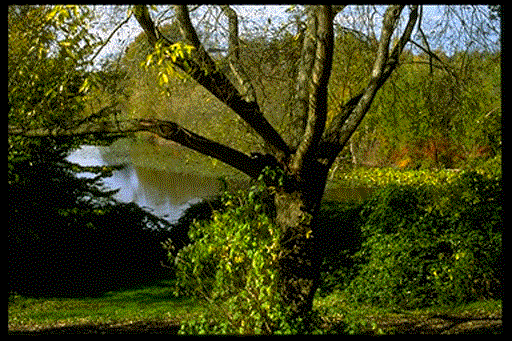- Righteousness
by Faith
- Christ and His
Righteousness
- by E. J. Waggoner
-
-
- Chapter 6 Importnat
Practical Lessons
-
-
-
It is not merely as a beautiful theory, a
mere dogma, that we should consider Christ as God and Creator.
Every doctrine of the Bible is for our practical benefit and
should be studied for that purpose. Let us first see what relation
this doctrine sustains to the central commandment of the law
of God. In Genesis 2:1-3 we find these words closing the record
of creation, "Thus the heavens and the earth were finished
and all the host of them. And on the seventh day God ended his
work which he had made; and he rested on the seventh day from
all his work which he had made. And God blessed the seventh day,
and sanctified it; because that in it he had rested from all
His work which God created and made." The Jewish translation
renders the text more literally thus, "Thus were finished
the heavens and the earth and all their host. And God had finished
on the seventh day His work which He had made," etc. This
is the same that we find in the fourth commandment, Ex. 20:8-
11.
-
In this we find, what is most natural, that
the same Being who created, rested. He who worked six days in
creating the earth, rested on the seventh and blessed and sanctified
it. But we have already learned that God the Father created the
worlds by his son Jesus Christ and that Christ created everything
that has an existence. Therefore the conclusion is inevitable
that Christ rested on that first seventh day at the close of
the six days of creation and that he blessed and sanctified it.
Thus the seventh day--the Sabbath--is most emphatically the Lord's
day. When Jesus said to the carping Pharisees, "For the
Son of man is Lord even of the Sabbath day" (Matt. 12:8),
He declared His lordship of the identical day which they had
so scrupulously observed in form, and He did this in words which
show that He regarded it as His badge of authority, as demonstrating
the fact that He was greater than the temple. Thus the seventh
day is the Divinely appointed memorial of creation. It is the
most honored of all days, since its especial mission is to bring
to mind the creative power of God, which is the one proof to
man of His Divinity. And so when Christ said that the Son of
Man is Lord even of the Sabbath day, He claimed a high distinction--nothing
less than being the Creator, of whose Divinity that day stands
as a memorial.
-
-
- What shall we say, then, to the suggestion
often made, that Christ changed the day of the Sabbath from a
day which commemorates completed creation to one which has no
such significance? Simply this, that for Christ to change or
abolish the Sabbath would be to destroy that which calls to mind
His Divinity. If Christ had abolished the Sabbath, He would have
undone the work of His own hands and thus have worked against
Himself, and a kingdom divided against itself cannot stand. But
Christ "cannot deny Himself," and therefore He did
not change one jot of that which He Himself appointed and which,
by testifying to His Divinity, shows Him to be worthy of honor
above all the gods of the heathen. It would have been as impossible
for Christ to change the Sabbath as it would have been to change
the fact that He created all things in six days and rested on
the seventh.
-
-
- Again, the oft-repeated declarations that
the Lord is Creator are intended as a source of strength. Notice
how creation and redemption are connected in the first chapter
of Colossians. To get the point fully before us, we will read
verses 9-19:
-

-
- For this cause we also, since the day
we heard it, do not cease to pray for you, and to desire that
ye might be filled with the knowledge of His will in all wisdom
and spiritual understanding; that ye might walk worthy of the
Lord unto all pleasing, being fruitful in every good work, and
increasing in the knowledge of God; strengthened with all might,
according to his glorious power, unto all patience and longsuffering
with joyfulness; giving thanks unto the Father, which hath made
us meet to be partakers of the inheritance of the saints in light;
who hath delivered us from the power of darkness, and hath translated
us into the kingdom of His dear Son; in whom we have redemption
through His blood, even the forgiveness of sins; who is the image
of the invisible God, the First-born of every creature; for by
him were all things created, that are in heaven, and that are
in earth, visible and invisible, whether they be thrones, or
dominions, or principalities, or powers; all things were created
by him, and for him; and he is before all things, and in him
all things consist. And he is the head of the body, the church;
who is the beginning, the first-born from the dead; that in all
things he might have the pre-eminence. For it pleased the Father
that in him should all fullness dwell.
-
-
- It is not an accident that the wonderful
declaration concerning Christ as Creator is connected with the
statement that in Him we have redemption. No. When the apostle
makes known his desire that we should be "strengthened with
all might, according to His glorious power," he lets us
know what that glorious power is. When he tells us about being
delivered from the power of darkness, he lets us know something
of the power of the Deliverer. It is for our comfort that we
are told that the head of the church is the Creator of all things.
We are told that he upholds all things by the word of His power
(Heb. 1:3), in order that we may rest in the assurance that "The
Hand which bears all nature up/Shall guard His children well."
-
-
- Note the connection of Isa. 40:26. The
chapter presents the wonderful wisdom and power of Christ, in
calling all the host of heaven by names and in keeping them all
in their places, by the greatness of His might and the strength
of His power, and then inquires, "Why sayest thou, O Jacob,
and speakest, O Israel, My way is hid from the Lord, and my judgment
is passed over from my God? Hast thou not known? hast thou not
heard, that the everlasting God, the Lord, the Creator of the
ends of the earth, fainteth not, neither is weary? there is no
searching of His understanding." On the contrary, "He
giveth power to the faint; and to them that have no might he
increaseth strength." His power is, in fact, the ability
to create everything from nothing; therefore, He can work wonders
through those who have no strength. He can bring strength out
of weakness. Surely, then, anything which serves to keep before
the mind the creative power of Christ must tend to renew our
spiritual strength and courage.
-
-
- And this is just the design of the Sabbath.
Read the ninety-second psalm, which is entitled a psalm of the
Sabbath-day. The first four verses are these:
-
-
- It is a good thing to give thanks unto
the Lord, and to sing praises unto thy name, O Most High; to
show forth thy loving kindness in the morning, and thy faithfulness
every night, upon an instrument of ten strings and upon the psaltery;
upon the harp with a solemn sound. For thou, Lord, hast made
me glad through thy work; I will triumph in the works of thy
hands.
-
-
- What has this to do with the Sabbath?
Just this: The Sabbath is the memorial of creation. Says the
Lord: "Moreover also I gave them my sabbaths, to be a sign
between me and them, that they might know that I am the Lord
that sanctify them." Eze. 20:12. The Psalmist kept the Sabbath
as God designed that it should be kept--in meditating upon creation
and the wondrous power and goodness of God displayed therein.
And then, thinking of that, he realized that the God who clothes
the lilies with a glory surpassing that of Solomon cares far
more for His intelligent creatures, and as he looked at the heavens,
which show the power and glory of God, and realized that they
were brought into existence from nothing, the encouraging thought
would come to him that this same power would work in him to deliver
him from human infirmity. Therefore he was glad, and he triumphed
in the work of God's hands. The knowledge of God's power which
came to him through a contemplation of creation, filled him with
courage, as he realized that the same power was at his disposal,
and, grasping that power by faith, he gained victories through
it. And this is the design of the sabbath; it is to bring man
to a saving knowledge of God.
-

-
- The argument, concisely stated, is this:
1. Faith in God is begotten by a knowledge of His power; to distrust
Him implies ignorance of His ability to perform His promises;
our faith in Him must be in proportion to our real knowledge
of His power. 2. An intelligent contemplation of God's creation
gives us a true conception of His power, for His eternal power
and Godhead are understood by the things which He has made. Rom.
1:20. 3. It is faith that gives victory (1 John 5:4); therefore,
since faith comes by learning the power of God from His word
and from the things that He has made, we gain the victory or
triumph through the works of His hands. The Sabbath, therefore,
which is the memorial of creation, is, if properly observed,
a source of the Christian's greatest reinforcement in battle.
-
-
- This is the import of Ezekiel 20:12. "Moreover,
also I gave them My Sabbaths, to be a sign between Me and them,
that they might know that I am the Lord that sanctify them."
That is, knowing that our sanctification is the will of God (1
Thess. 4:3; 5:23, 24), we learn, by means of the Sabbath, properly
used, what the power of God is that is exerted for our sanctification.
The same power that was put forth to create the worlds is put
forth for the sanctification of those who yield themselves to
the will of God. Surely this thought, when fully grasped, must
bring joy and comfort in God to the earnest soul. In the light
of this, we can appreciate the force of Isaiah 58:13, 14:
- If thou turn away thy foot from the Sabbath,
from doing thy pleasure on my holy day; and call the Sabbath
a delight, the holy of the Lord, honorable; and shalt honor Him,
not doing thine own ways, nor finding thine own pleasure, nor
speaking thine own words; then shalt thou delight thyself in
the Lord; and I will cause thee to ride upon the high places
of the earth, and feed thee with the heritage of Jacob thy father;
for the mouth of the Lord hath spoken it.
-
-
- That is, if the Sabbath is kept according
to God's plan, as a memorial of His creative power, as bringing
to mind the Divine power that is put forth for the salvation
of His people, the soul, triumphing in the work of His hands,
must delight itself in the Lord. And so the Sabbath is the grand
fulcrum for the lever of faith, which lifts the soul to the heights
of God's throne, to hold communion with Him.
- To put the matter in few words, it may
be stated thus: The eternal power and Godhead of the Lord are
revealed in creation. Rom. 1:20. It is the ability to create
that measures the power of God. But the Gospel is the power of
God unto salvation. Rom. 1:16. Therefore the Gospel simply reveals
to us the power which was used to bring the worlds into existence,
now exerted for the salvation of men. It is the same power in
each case.
-
-
- In the light of this great truth, there
is no room for the controversy about redemption being greater
than creation, because redemption is creation. See 2 Cor. 5:17;
Eph. 4:24. The power of redemption is the power of creation;
the power of God unto salvation is the power which can take human
nothingness and make of it that which shall be throughout eternal
ages to the praise of the glory of the grace of God. "Wherefore
let them that suffer according to the will of God commit the
keeping of their souls to Him in well doing, as unto a faithful
Creator." 1 Peter 4:19.
-
-
-
-

- [Back] [Contents] [Next]


